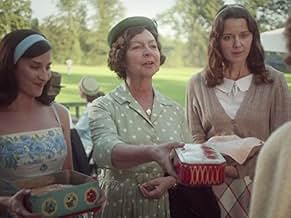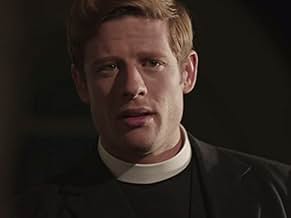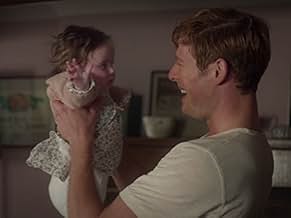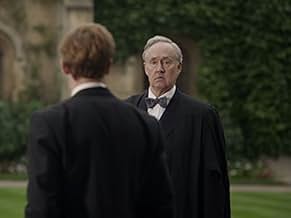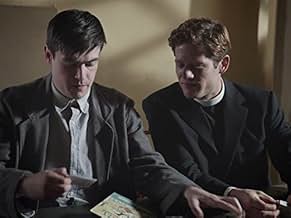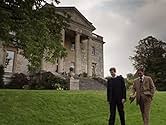Ein Geistlicher aus Cambridgeshire untersucht in seinem kleinen Dorf Grantchester eine Reihe von mysteriösen Fehlverhalten.Ein Geistlicher aus Cambridgeshire untersucht in seinem kleinen Dorf Grantchester eine Reihe von mysteriösen Fehlverhalten.Ein Geistlicher aus Cambridgeshire untersucht in seinem kleinen Dorf Grantchester eine Reihe von mysteriösen Fehlverhalten.
- Auszeichnungen
- 3 Nominierungen insgesamt
Folgen durchsuchen
Empfohlene Bewertungen
I like Grantchester for the period costumes and the Cambridgeshire setting, the plots are rather tame but what I do dislike about it is that the attitudes that it portrays are so anachronistic. The scriptwriters are becoming more determined to add in 21st century attitudes and to be politically correct, and this is completely out of place for a drama set in the 1950s. I had a rolling eyes moment when Chambers and Keating greeted each other with a hug - for heaven's sake, British men didn't even do that in the 1980s, let alone the 1950s! A handshake would have been a sign of affection but a hug - absolutely not. I really can't see a vicar that I would have known in my youth (in the 1970s) let himself go to that extent, I'm thinking in particular or the 'simulated sex on the dance floor scene' - even non-clergy wouldn't have behaved like that in the 1950s. People just didn't behave like that in public.
Another reviewer felt that Grantchester was better than Jeremy Brett's Sherlock; I think absolutely not. I know my British history in great depth and that version of Sherlock had an authentic feel of Victorian Britain. Grantchester viewers could be left thinking that the 1950s were not much different to today, just different clothes, and that certainly isn't true.
Another reviewer felt that Grantchester was better than Jeremy Brett's Sherlock; I think absolutely not. I know my British history in great depth and that version of Sherlock had an authentic feel of Victorian Britain. Grantchester viewers could be left thinking that the 1950s were not much different to today, just different clothes, and that certainly isn't true.
Maybe Patzak1974 is unaware that this series is based on stories by James Runcie, son of a former Archbishop of Canterbury who had himself served as a tank commander in WW2 before being ordained. Though James wasn't born until 1959, I think we can assume that he based the character of Sidney on conversations he had had with his father about his wartime experiences and how they affected his faith.
Personally, I find the character much more believable than many portrayals of clergy I've seen in TV dramas. At least he is correctly addressed as "Mr Chambers", since the American habit of addressing priests as "Reverend" had not then reached these shores!
Personally, I find the character much more believable than many portrayals of clergy I've seen in TV dramas. At least he is correctly addressed as "Mr Chambers", since the American habit of addressing priests as "Reverend" had not then reached these shores!
We loved this series through three seasons. The fourth is unfaithful to the characters, has absurd plots, and is poorly written. We won't be watching Season Five.
Grantchester since the very first episode has been particularly good viewing, the concept of a clergyman helping the local detective solve all manner of village crimes initially seemed a wee bit far fetched,and better suited to the Father Brown afternoon slot,but it's totally engaging, intriguing, and sometimes contains a level of grit.
The combination of Robson Green and James Norton as Sidney and Geordie is a good one, they play of each other incredibly well, they frequently see all that is good and bad in one another. Tessa Peake Jones is particularly good as Mrs Maguire.
I can't recall seeing a bad episode, always consistent, some of the standout episodes include the finale of series one, and series three's Christmas special. I'm impressed how they manage to make each episode feel so unique, and the personal lives of the lead duo add to the story.
A perfect way to end the week, Sunday evening Grantchester. 8/10
The combination of Robson Green and James Norton as Sidney and Geordie is a good one, they play of each other incredibly well, they frequently see all that is good and bad in one another. Tessa Peake Jones is particularly good as Mrs Maguire.
I can't recall seeing a bad episode, always consistent, some of the standout episodes include the finale of series one, and series three's Christmas special. I'm impressed how they manage to make each episode feel so unique, and the personal lives of the lead duo add to the story.
A perfect way to end the week, Sunday evening Grantchester. 8/10
I have just finished viewing the sixth episode of Granchester and am pleased to see that the series is being continued for another season. After viewing the sixth show, I detect a dramatic shift in the characters who have now become very close friends. The show has also matured into a somewhat dark, psychological drama where the pain and the character flaws of the two men are as much a part of the show as the murder mysteries they solve together.
At the start of the series, the police officer, Geordie Keating, played by Robson Green, was suspicious of the idealistic vicar, Sidney Chambers, played by James Norton, whose life was so different than his own. After a few months, Sidney wins Geordie's friendship by using his intuitive skills to help him solve the ongoing murders that plague the village. Geordie is a no nonsense police officer with a wife and four children who is made to appear almost as a "Columbo" figure (from the U.S. television show in the 1970's and 80's) with his worn-out raincoat and hunched figure. He is a drinker and a World War II veteran. Chambers also likes to imbibe, a bit too much, and has had a series of ill-fated affairs, going against the grain for an Anglican vicar. Chambers is well aware of his shortcomings but he has a huge heart which not only endears him to women but enables him to see the best in the people of his village.
Chambers also helps Geordie through a serious crisis in his family when one of his children becomes seriously ill and Geordie is unable to be with his family and share the pain that his wife Cathy is feeling; he has been trained in both war and peace to keep emotions in check. Chambers has a great heart but he is no fool and when there is a murder, he jumps right into the action, giving the overworked Geordie the benefit of his insights. We see a number of sub-plots in the series, with some comic relief from the vicar's housekeeper, Mrs. McGuire, who treats her boss like a wayward son, finding the empty whiskey bottles and watching his liaisons with the women in his life. Then there is Sidney's curate, who is unwise to the world and full of false dreams about his idyllic life as a country priest. His naive nature soon takes a beating under the patient and watchful eye of Sidney, who has much more experience to draw upon.
Sidney must also navigate around the impending marriage of his former lover who he stills sees socially from time to time. It is clear that the two still care deeply for one another. The show has some dramatic flashbacks for Sidney that haunt him long after the war. Geordie has also been through the ordeal of war and knows the moral ambiguities that Sidney faces. The personal sides of the two men have become more pronounced as the show moved through subsequent episodes. I am looking forward to seeing the next season.
At the start of the series, the police officer, Geordie Keating, played by Robson Green, was suspicious of the idealistic vicar, Sidney Chambers, played by James Norton, whose life was so different than his own. After a few months, Sidney wins Geordie's friendship by using his intuitive skills to help him solve the ongoing murders that plague the village. Geordie is a no nonsense police officer with a wife and four children who is made to appear almost as a "Columbo" figure (from the U.S. television show in the 1970's and 80's) with his worn-out raincoat and hunched figure. He is a drinker and a World War II veteran. Chambers also likes to imbibe, a bit too much, and has had a series of ill-fated affairs, going against the grain for an Anglican vicar. Chambers is well aware of his shortcomings but he has a huge heart which not only endears him to women but enables him to see the best in the people of his village.
Chambers also helps Geordie through a serious crisis in his family when one of his children becomes seriously ill and Geordie is unable to be with his family and share the pain that his wife Cathy is feeling; he has been trained in both war and peace to keep emotions in check. Chambers has a great heart but he is no fool and when there is a murder, he jumps right into the action, giving the overworked Geordie the benefit of his insights. We see a number of sub-plots in the series, with some comic relief from the vicar's housekeeper, Mrs. McGuire, who treats her boss like a wayward son, finding the empty whiskey bottles and watching his liaisons with the women in his life. Then there is Sidney's curate, who is unwise to the world and full of false dreams about his idyllic life as a country priest. His naive nature soon takes a beating under the patient and watchful eye of Sidney, who has much more experience to draw upon.
Sidney must also navigate around the impending marriage of his former lover who he stills sees socially from time to time. It is clear that the two still care deeply for one another. The show has some dramatic flashbacks for Sidney that haunt him long after the war. Geordie has also been through the ordeal of war and knows the moral ambiguities that Sidney faces. The personal sides of the two men have become more pronounced as the show moved through subsequent episodes. I am looking forward to seeing the next season.
Wusstest du schon
- WissenswertesSeries 2 is the first to have a series-long "B-story" beginning with the first episode and ending with the series finale.
- PatzerAs Chambers and Geordie arrive in London on the train, there is a board showing the calling points. The first three are Cambridge, Shelford, and Foxton. There are two lines between Cambridge and London. Shelford and Foxton are the first stations out of Cambridge on two different lines so a train cannot have called at both of them.
- VerbindungenFeatured in Too Much TV: Folge #1.4 (2016)
Top-Auswahl
Melde dich zum Bewerten an und greife auf die Watchlist für personalisierte Empfehlungen zu.
- How many seasons does Grantchester have?Powered by Alexa
Details
Zu dieser Seite beitragen
Bearbeitung vorschlagen oder fehlenden Inhalt hinzufügen









